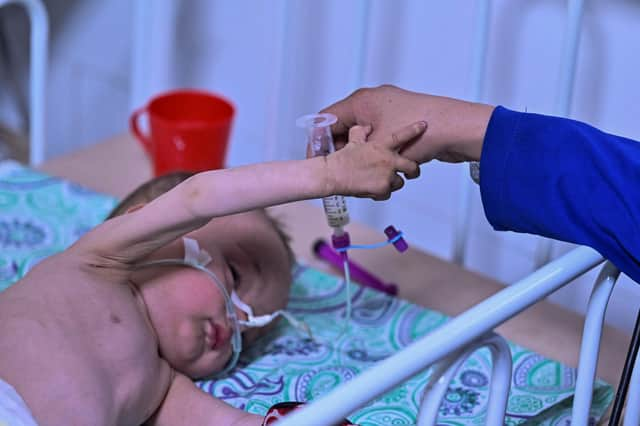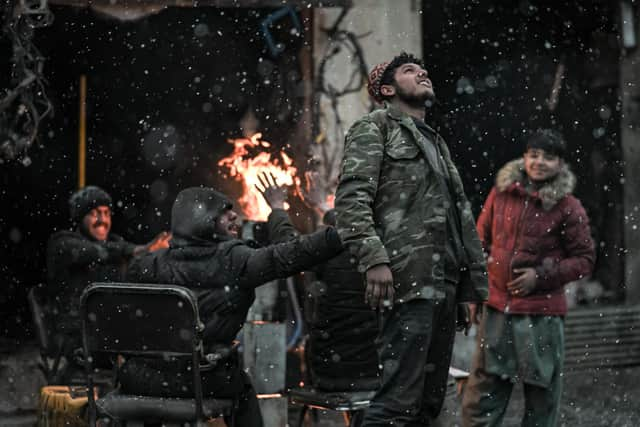DEC Afghanistan Crisis Appeal: As famine looms, a million children under the age of five are at risk of death in next few months – Jack McConnell


Months on, as we deal with the challenges of another Covid strain and try to protect our own relatives, I hope we have not forgotten those scared and vulnerable families.
Imagine having to deal with this pandemic when you and your family have had to endure years of civil war and now, on top of that, the consequences of increasingly unpredictable weather linked to climate change. That is the reality for millions of people in Afghanistan right now, facing terrible food shortages and even starvation as winter bites.
Advertisement
Hide AdAdvertisement
Hide AdIn this crucible of superpower rivalry through the generations, there has now been an almost unprecedented economic collapse. The speed and scale of this crisis is something aid workers have never seen before.
This, of course, was precipitated by the recent change of regime in Kabul, but that coincided with the worst drought in nearly 30 years and then the pandemic, which can spread so much more easily given less than ten per cent of the population has been vaccinated and health services have been decimated.
For all these reasons, the Disaster Emergency Committee has again launched one of its rare but vital appeals for funds, from me, from you, from anyone or any organisation in Scotland in a position to help.
The statistics are pretty hard to get your head around. More than 22 million people are short of food, as many as eight million are on the brink of famine. Probably most distressing of all, we know children are already dying through malnutrition and a million more under the age of five are at risk of dying over the three coldest winter months ahead.


If you can picture Afghanistan in your head – a vast open, rugged landscape – it’s no surprise that through years of turmoil, agriculture has remained the backbone of Afghani livelihoods. Around 70 per cent of Afghans live in rural areas and agriculture accounts for at least 25 per cent of GDP.
The severe drought has destroyed crops and many herders have seen their livestock die or been forced to slaughter or sell them. Without grain from the previous harvest, they have no money to buy new seeds. The lack of rain is expected to continue well into next year too.
Those existing weaknesses and the ongoing conflict meant Afghanistan was already the poorest country in Asia before the recent battle for Kabul.
The Covid pandemic has also devastated income from remittances from families who have moved overseas with inflation sky high and work hard to find.
Advertisement
Hide AdAdvertisement
Hide AdWith foreign currency reserves frozen and the banking system unable to provide cash, millions of workers, including government employees like doctors and teachers, have not been paid for months. People have been forced to sell possessions to buy essentials or queue for hours to withdraw savings. There are reports that children are being sold by parents just to feed the rest of the family.
This crisis has been decades in the making and it has come to head right now. This will take years to put right but what can be done to help today?
This is where the Disasters Emergency Committee can make the life-saving difference in the critical days and weeks to come. Its 15 UK members have years of experience in these difficult environments and are already coordinating closely with the local authorities and UN agencies to deliver humanitarian assistance in ways that are best suited to the needs of those affected.
With your help they can rapidly scale up their relief work once again, but there is no time to lose. The immediate priority is getting food packets, including emergency nutrition paste for young children to prevent starvation.
Other priorities are supporting hospitals and health facilities, ensuring shelters are fit for the freezing winter, and providing clean water and sanitation to prevent the spread of diseases, including Covid. DEC charities have negotiated access for female aid workers to ensure that the particular needs of women and girls are being met and that they are protected and not excluded.
If you can please, don’t delay and support the appeal now. A donation of £10 could provide treatment to a child suffering from malnutrition for three weeks – £100 could provide emergency food to a homeless family for three months
We sense from our own experiences here in Scotland and beyond over the past 18 months that the world has shifted on its axis.
For many poorer parts of the world like Afghanistan, the life-or-death challenges faced by millions are coalescing around what humanitarian workers call “The 3 Cs” – the deadly combination of conflict, the Covid pandemic and the climate emergency driving increasingly erratic and extreme weather.
Advertisement
Hide AdAdvertisement
Hide AdHowever, here in Scotland and across the UK, we may also have a stronger sense than ever of our shared global challenges and what could and should be done. Only weeks after world leaders met in Glasgow to discuss the climate emergency, and as we face another winter crisis with Covid, we perhaps feel a greater shared sense of global interdependence and our responsibility to do something about it.
I hope you sense that this global solidarity is now more badly needed than ever and despite this difficult time for everyone here at home, you can dig deep to help millions of families like ours who face a desperate winter ahead in Afghanistan. The McConnell International Foundation will be donating to this emergency appeal, and I hope you can too.
Rt Hon Lord Jack McConnell was First Minister of Scotland from 2001 to 2007
Donations to DEC’s Afghanistan Crisis Appeal can be made online, by texting SUPPORT to 70150 to give £10, or by phone on 0370 60 60 610
A message from the Editor:
Thank you for reading this article. We're more reliant on your support than ever as the shift in consumer habits brought about by coronavirus impacts our advertisers.
If you haven't already, please consider supporting our trusted, fact-checked journalism by taking out a digital subscription.
Comments
Want to join the conversation? Please or to comment on this article.
